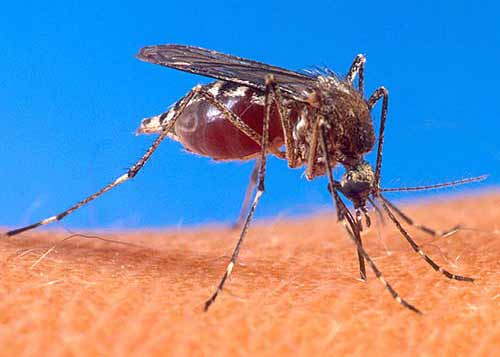Rain, Heat Grow Mosquito Populations Increasing West Nile Concerns

This article was provided by AccuWeather.com.
The intense heat wave and stifling humidity that has overtaken much of the country this week has helped increase mosquito populations, which spurs concerns over the potentially fatal West Nile Virus.
A period of record-breaking rain earlier in the month helped create preferable conditions for mosquitoes to nest in, as they thrive in pools of stagnant water. Some areas in the South, from the Gulf Coast into the Carolinas, received more than a foot of rain in less than a month. Parts of the Ohio Valley into the Northeast received more than 8 inches. The heat that followed then aided the growing process for the insects, maturing them from egg to adult in as little as a week.
According to Andy Kyle, section chief of Vector Management of the Department of Environmental Protection, the biggest threat that mosquitoes have is their ability to spread West Nile Virus, a disease with no vaccination and no known cure. While most people who get West Nile Virus are able to recover from it using over-the-counter medications to treat the few symptoms it creates, it can cause neurological complications or lead to death.
Positive tests of West Nile Virus are picking up recently, which experts told AccuWeather.com is on track for an average season. Mosquito populations are usually worst in early August, so it is likely that the peak time for spreading the disease is fast-approaching. The Centers for Disease Control and Prevention lists 23 total cases of West Nile Virus so far this year, resulting in three deaths.
RELATED: The Bugs of Summer: Why Am I a Mosquito Magnet? High Temperatures Spread Across the US One-Minute Mosquito Prevention
"People should take precautions [against mosquitoes] now of course, but it will be especially important in the coming weeks," Kyle said.
Sign up for the Live Science daily newsletter now
Get the world’s most fascinating discoveries delivered straight to your inbox.
The heat will not only cause mosquitoes to mature at a more rapid rate, but it also helps the virus incubate in birds that have been infected. That will make it easier for mosquitoes to pick up the virus and spread it to humans.
Fortunately, while the heat will accelerate the maturity process in mosquitoes, it will also shorten their lifespan. Kyle said that their typical lifespan is three to four weeks, but in the higher temperatures that have recently faced most of the country it may be shortened to only two weeks.
Not all species of mosquitoes are capable of carrying the disease, so being bitten is not a surefire way to get infected.
"Most mosquitoes are just nuisance mosquitoes," Kyle said.
The best way for people to protect themselves from West Nile Virus is to prevent being bitten by a mosquito transmitting it:
Tips for Avoiding Mosquitoes
1. Check your property for pooling water after a rainstorm. Buckets, tarps, wheelbarrows and other containers that hold water can be breeding grounds for mosquitos. 2. Avoid being outside at peak hours. Mosquitoes hate the heat and will be more active at dusk and during early morning hours. 3. Wear light-colored clothing Mosquitoes are attracted to bright colors. 4. Wear long sleeves and pants 5. Use an oscillating fan Mosquitoes are weak fliers and can't reach you with a strong breeze. 6. Use bug spray Especially those with DEET, picaridin, IR3535, or certain essential oils. 7. Have screens on windows and doors. Be sure they are intact and free of tears.
However, West Nile Virus does not have very strong symptoms, so it may be hard to detect if someone is infected.
West Nile Virus Symptoms
1. According to the CDC, 70 to 80 percent of those infected will not have any symptoms. 2. A smaller percentage of the infected population will experience fever, chills, vomiting, aches and possible rashes, which typically go away on their own. 3. Severe symptoms of West Nile Virus can be a sign of a serious neurological complication and brain inflammation. 4. Ten percent of those who develop a neurological infection from West Nile Virus do not survive it. These signs include neck stiffness, high fever, paralysis, tremors and disorientation.
If experiencing any symptoms after a mosquito bite, people are urged to go to see a doctor or go to the hospital.
Last year was the most deadly year yet for West Nile Virus cases in the U.S. with 286 fatalities. There have been 1,549 deaths attributed to the disease since it was first found in the U.S. in 2001. The first case of it was in New York, but it has now been found in all 48 contiguous states. Kyle does not see an end to it any time soon.
"West Nile is here to stay. We're going to have to deal with it," Kyle said.
AccuWeather.com. All rights reserved. More from AccuWeather.com.









